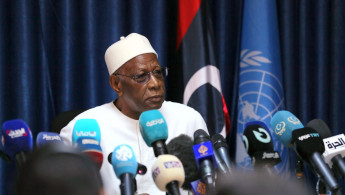UN sees 'historic' chance to end Libya political crisis
Libyans have a "historic opportunity" to tackle the political crisis that has haunted the country since 2011, the UN's special ambassador to Libya said Tuesday, still hoping for elections later this year.
"An historic opportunity is open for overcoming the decade-long crisis," Abdoulaye Bathily, head of the United Nations Support Mission in Libya (UNSMIL), told a Security Council meeting.
"There has been a new dynamic in Libya" in recent weeks, Bathily said.
"Intensive consultations have taken place amongst security actors. Institutional and political leaders have also taken action to move the political process forward."
Bathily pointed to several March and April meetings between military representatives from various regions of the country.
Representatives at the gatherings, which Bathily said represent a breakthrough, "committed to support all stages of elections, reject violence throughout Libya (and) take practical steps for the safe return of the internally displaced persons," he said.
These meetings served a substantial symbolic purpose in the effort to reconcile and unify the country, he added.
But the "new national dynamic" must be sustained and amplified, Bathily said.
"If the transmission of power from Khalifa to Saddam proves difficult, Saddam will not necessarily be able to fix things using violence as a deterrent"
— The New Arab (@The_NewArab) February 3, 2023
Warlord 2.0: Will Saddam Haftar be his father's successor? 👇 https://t.co/HpYTBuWSFX
"UNSMIL will intensify its facilitation and mediation," he assured, "to support the realization of all political, legal and security requirements so elections can be held this year."
Presidential and legislative elections, initially set for December 2021, have been postponed several times over issues including the legal basis of the polls and the participation of controversial candidates.
Libya has seen more than a decade of stop-start conflict since the 2011 revolt that toppled strongman Muammar Gaddafi, with a myriad of militias forming opposing alliances backed by foreign powers.
It remains split between a nominally interim government in Tripoli in the west, and another in the east backed by military strongman Khalifa Haftar.
Bathily had announced a new initiative to push forward in February and said last month he hopes to have an agreement set "by mid-June" to hold elections before the end of 2023.





 Follow the Middle East's top stories in English at The New Arab on Google News
Follow the Middle East's top stories in English at The New Arab on Google News


